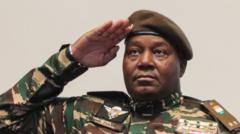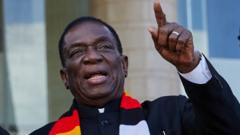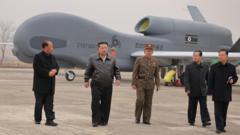The new leadership aims for stability and control while addressing ongoing security challenges amid calls for promised democratic reforms.
Niger's Military Leader Assumes Presidency Amid Transition to Democratic Rule

Niger's Military Leader Assumes Presidency Amid Transition to Democratic Rule
General Abdourahamane Tchiani takes oath as Niger's president for a five-year transitional period following a military coup.
Niger's military ruler, General Abdourahamane Tchiani, has officially been sworn in as president for a five-year transitional government after leading a coup that ousted the democratically elected President Mohamed Bazoum in 2023. The ceremony took place in the capital, Niamey, where Gen Tchiani also received the highest military rank of army general. He signed a decree that marks the dissolution of all political parties in the country, asserting that this move is aimed at aligning the nation with traditional constitutional values.
In his inaugural address, Gen Tchiani expressed a commitment to fulfilling the responsibilities of his new position with humility, emphasizing the importance of stability and security in Niger. The governance period, as defined by the new charter, is deemed "flexible," indicating that the transition to civilian rule may be adjustable based on the country’s security circumstances, particularly in light of ongoing jihadist uprisings that have plagued Niger for several years.
Tchiani's leadership also comes amid a wave of military coups in the Sahel region, with neighboring nations like Mali, Guinea, and Burkina Faso adopting similar governance models. These countries have severed ties with France, their former colonial ruler, and have sought closer relations with Russia. Notably, Tchiani's government had a contentious relationship with the Economic Community of West African States (Ecowas), especially when a proposed three-year transition plan after the coup was deemed inadequate.
While Gen Tchiani's regime is focused on stability, it faces criticism for its handling of the former president, who remains detained under accusations of high treason and threats to national security. Bazoum has been held alongside his family in the presidential palace since the coup. The military junta has claimed that the newly enacted charter includes unprecedented measures to ensure that Niger's natural resources benefit its citizens rather than foreign entities.
With the future uncertain, Niger's new leadership seeks to navigate both internal and external challenges while striving for a return to a stable, democratic political landscape.
In his inaugural address, Gen Tchiani expressed a commitment to fulfilling the responsibilities of his new position with humility, emphasizing the importance of stability and security in Niger. The governance period, as defined by the new charter, is deemed "flexible," indicating that the transition to civilian rule may be adjustable based on the country’s security circumstances, particularly in light of ongoing jihadist uprisings that have plagued Niger for several years.
Tchiani's leadership also comes amid a wave of military coups in the Sahel region, with neighboring nations like Mali, Guinea, and Burkina Faso adopting similar governance models. These countries have severed ties with France, their former colonial ruler, and have sought closer relations with Russia. Notably, Tchiani's government had a contentious relationship with the Economic Community of West African States (Ecowas), especially when a proposed three-year transition plan after the coup was deemed inadequate.
While Gen Tchiani's regime is focused on stability, it faces criticism for its handling of the former president, who remains detained under accusations of high treason and threats to national security. Bazoum has been held alongside his family in the presidential palace since the coup. The military junta has claimed that the newly enacted charter includes unprecedented measures to ensure that Niger's natural resources benefit its citizens rather than foreign entities.
With the future uncertain, Niger's new leadership seeks to navigate both internal and external challenges while striving for a return to a stable, democratic political landscape.






















